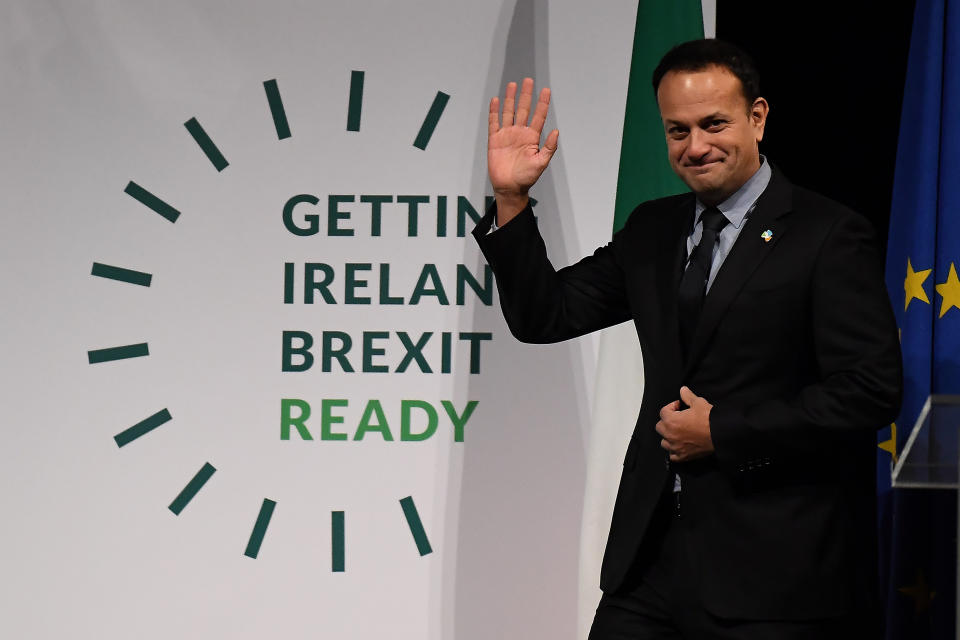As Brexit looms, Ireland is taking the lead on preparing its businesses

A senior Bank of England official recently warned that UK businesses “don’t really know how to prepare” for a no-deal Brexit. Even though Britain is on the cusp of sealing a Brexit deal, the risk of no-deal scenario is still a possible reality, as the agreement needs to go through parliament.
At the moment, businesses only have the vaguely worded “technical notices” from the UK’s Brexit department as resources to go on. Meanwhile, Ireland’s state agencies are in an advanced stage of helping the country, whose economy the International Monetary Fund says could be impacted just as much as the UK’s, prepare for every kind of outcome.
On Friday, for instance, Ireland’s foreign affairs minister Simon Coveney will open a packed-out “Getting Ireland Brexit Ready” workshop, the fifth such event organised by his department.
Leaders from semi-state agencies like Enterprise Ireland, which supports export-driven Irish businesses, and Bord Bia, which focuses on the country’s food and drink industry, are among the regular panellists at these workshops.
READ MORE: Prospect of no-deal Brexit shapes Ireland’s 2019 budget
“Nearly everything that we do now is defined by Brexit,” Shane Hamill, the overseas trade manager of Bord Bia, told Yahoo Finance UK. In 2017, some 35%, or €4.4bn (£3.9bn, $4.9bn), of the industry’s exports were to the UK.
In March 2017, before prime minister Theresa May had even triggered the Article 50 departure process from the European Union, Bord Bia launched its “Brexit Barometer” survey. This, Hamill said, was to “cut through the noise and speculation around Brexit” — and allowed the agency to develop an evidence-based preparedness strategy for the entire industry.
And so the agency launched a series of workshops aiming to help its clients identify the practical steps they could take to insulate themselves from Brexit impacts. It released a supply chain guide and a new database of reliable distributors and logistics partners in export markets, encouraging firms to diversify away from the UK.
READ MORE: Brexit fears send Irish business confidence to lowest level since 2012
While the second iteration of the survey, in March 2018, found that around 75% of the companies it supports were “making plans or taking action” related to Brexit, it also started to get more specific.
Only a third of businesses felt “highly or moderately confident about managing their post-Brexit customs processes,” and only half of respondents were able to identify the right tariff classifications for their products.
“So we launched a customs and tariffs training programme,” Hamill said. Companies get eight hours of group training and two hours of one-to-one mentoring. Meanwhile, dozens of companies have participated in its currency-risk training programme.
While Hamill said that Bord Bia “remains committed to the UK market,” Brexit also prompted the agency to launch its largest-ever market diversification exercise. It has expanded its overseas headcount, and will have staff for the first time in Japan, North Africa and West Africa.
“From even the week before the referendum in June 2016, we’ve been telling our clients to prepare for a no-deal Brexit, hard Brexit, cliff-edge Brexit—whatever you want to call it,” Jonathan McMillan, the head of Enterprise Ireland’s Brexit unit, told Yahoo Finance UK.
READ MORE: Irish government criticised for ‘self-congratulations’ on Brexit deal
One of its early innovations was a scorecard that any company can use to assess how prepared it is for Brexit. And its clients can apply for €5,000 (£4,400) “Be Prepared” grants—money that can be put towards Brexit-related consultancy and travel. And, like Bord Bia, it runs workshops for its clients.
“We call it no-regret planning,” he said. And while Enterprise Ireland’s message remains steadfast no matter what the prevailing mood, the “media ups and downs” do have a tendency to shift the focus of its clients, particularly if there’s a lot of talk about no-deal scenarios. “That’s when the level of activity on our Brexit website goes through the roof,” McMillan said.
That said, there is definitely no “Brexit fatigue,” he insisted. “We have to bring in extra seating and there’re often people standing at our workshops.”

Nor is there evidence of Brexit fatigue at the big Brexit Ready conferences, which tend to be held in upmarket conference centres. The venue for the last one, held in October in Dublin, had to be moved to the city’s largest convention centre so that it could cater for the hundreds of businesses who wanted to attend.
READ MORE: Varadkar says EU and UK would need a ‘no-deal Brexit deal’
It was opened with an at-times-jovial joint interview of prime minister Leo Varadkar and Coveney, who said then they were optimistic that the European Union would bash out a deal with the UK.
But Ireland is “not under any illusions about the complexity of Brexit,” a spokesperson for the Irish foreign ministry told Yahoo Finance UK on Thursday.
“We don’t have all the answers but there are steps businesses can be taking now, and there are state supports to pay for those steps. That is what these seminars are about.”

 Yahoo Finance
Yahoo Finance 